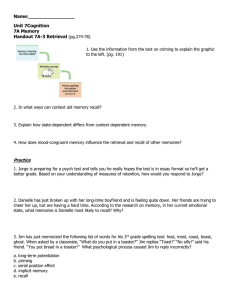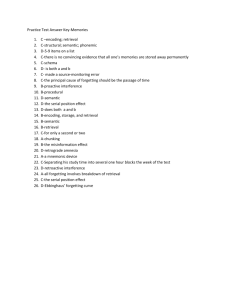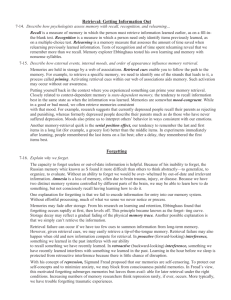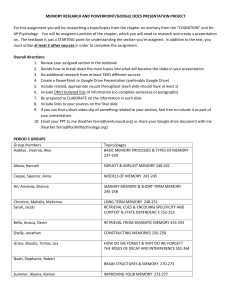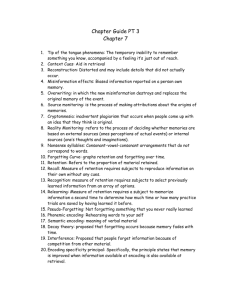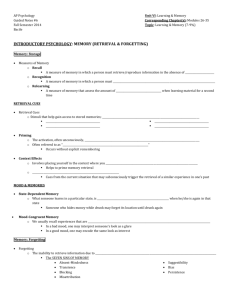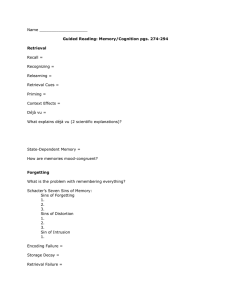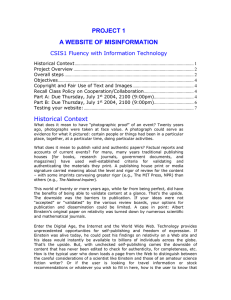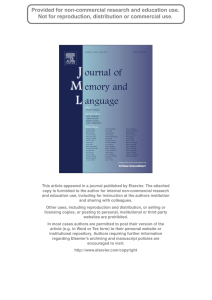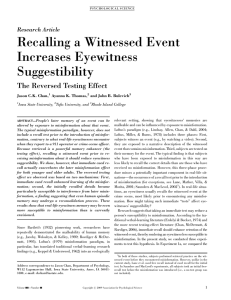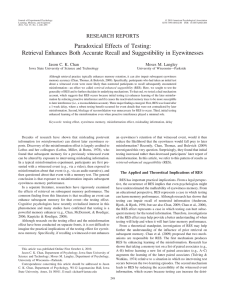Intro to Memory Part 2 PPT
advertisement
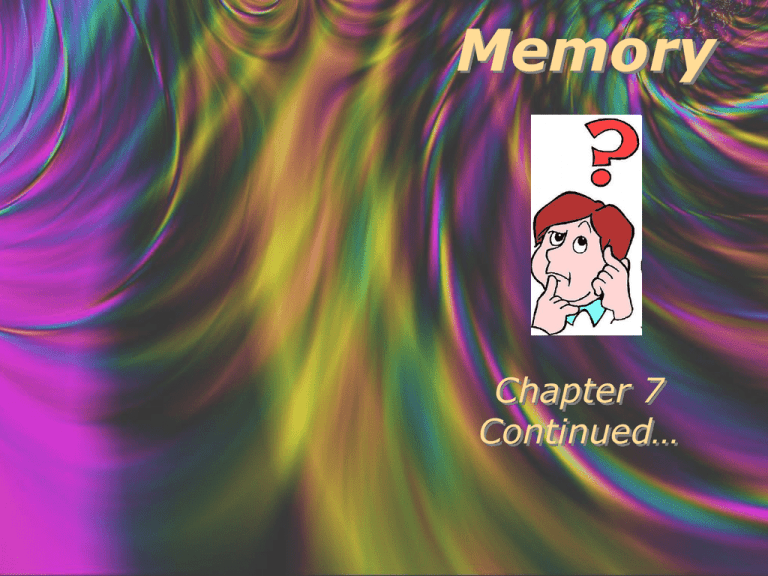
Memory Chapter 7 Continued… How is knowledge organized? Clustering: the tendency to remember similar or related items in groups Conceptual Hierarchy: multilevel classification system based on common properties among items How is knowledge organized? Schemas: an organized cluster of knowledge about a particular object or event abstracted from previous experience with the object or event People are more likely to remember things that are consistent with the schemas than things that are not and people sometimes exhibit better recall of things that violate their schema-based expectations How is knowledge organized? Semantic Networks: consists of nodes representing concepts, joined together by pathways that link related concepts Proven to be useful in explaining why thinking about one word can make closely related words easier to remember Semantic Networks Retrieval Tip-of-the-tongue phenomenon: the temporary inability to remember something you know, accompanied by a feeling that it’s just out of reach Usually happens about once a week – especially with names Clearly constitutes a failure in retrieval Retrieval Retrieval Cues: stimuli that help gain access to memories Reinstating the Context of an Event: this is trying to recall a memory by putting yourself back in the context in which it occurred – this involves working with context cues to aid retrieval Context Cues: often facilitate the retrieval of information Used successfully in legal matters and investigations Misinformation Effect Reconstructing Memories and the Misinformation Effect: when you retrieve information from long-term memory you aren’t able to pull up a “mental videotape” that provides an exact replay to some degree, memories are just reconstructions of the past that may be distorted and may include details that did not actually occur Misinformation Effect Elizabeth Loftus Researched the misinformation effect and found that reconstructive distortions show up very frequently in eyewitness testimony ァ 3 Stages 1. View event 2. Exposed to information about event, some of which is misleading 3. The recall of the original event is tested to see if the post-event misinformation alters the memory of the actual event Misinformation Effect Ex subjects shown a video of an accident and then “grilled” to provide testimony Biasing information was introduced Words such as “hit” and “smashed into” were used A week later, recall of the event was tested and people who were asked questions with vivid imagery words like “smashed into” remembered seeing things like broken glass (which wasn’t present) Why are there distortions in eyewitness testimony? People’s Schema’s put words like “smashed into” and broken glass or tons of damage together in the same category Measures of Forgetting Retention: the proportion of material retained (remembered) Recall: Reproduction of information on your own without any cues Recognition: The ability to select previously learned information from an array of options Relearning: memorizing information a second time to determine how much time or how many practice trials are saved by having learned it before Why We Forget? Ineffective Coding Information may have never been inserted into memory properly Decay Theory Forgetting occurs because memory traces fade over time Can we really forget Pseudoforgetting: you can’t really forget what you haven’t learned Another name for Ineffective Coding what has been stored in Long Term Memory permanently? Why We Forget? Interference Theory Retroactive Interference: new info impairs the retention of previously learned material Proactive Interference: retention of previously learned material interferes with the learning of new material Why We Forget? Retrieval Failure A mismatch occurs between retrieval cues and the encoding Motivated Forgetting People keep embarassing or painful events buried in the unconscious Also called Repression Think About It… When it comes to school & your study habits, what causes you to forget the most? Discuss your answers with the class. Are there similarities among your answers? Why?
